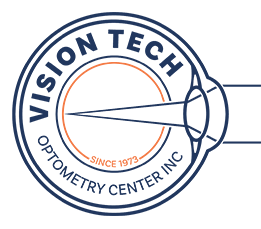
Myopia is the official term used to describe being near-sighted. When someone is myopic, they can see nearby objects such as their phone screen or a book clearly without using prescription lenses. However, objects that are further away appear increasingly blurred. Myopia occurs because of a problem with the way that light is refracted by the eyes. Instead of being refracted directly onto the retina, which is the patch of light-sensitive cells at the back of the eye, the light is refracted in front of it.
Myopia is the most common refractive eye condition in the world. It usually begins in childhood between 6 and 13 years of age and will continue to worsen until the eyes stop growing. Anyone can develop myopia, but you are more likely to be affected if your parents also have the condition.
The Dangers of Myopia
While being near-sighted may not sound serious, it does have an effect on your child’s day-to-day life and they will need prescription lenses in order to be able to see clearly. However, that’s not all. People who have high myopia in adulthood are much more likely to experience a variety of different eye conditions – many of which have severe and permanent consequences for your vision. These include:
Glaucoma
Cataracts
A detached retina
Diagnosing myopia and starting myopia management early can help to counteract this risk and keep your child’s myopia firmly under control.
What Age Should My Child Start Myopia Management?
There is no official age requirement for starting myopia management, but in many instances, eye doctors will recommend that a child begins as soon as possible. This is particularly true if they are at high risk of developing severe myopia (a prescription of > -6.00) in the future. High myopia in adulthood is much more likely if a child develops myopia in early childhood, particularly before the age of 10. In fact, research indicates that the earlier a child becomes myopic, the faster their eyesight is likely to deteriorate.
What Options are Available for Myopia Management?
Fortunately, there are a number of different treatment techniques that are used for myopia management. These include the following:
Prescription Glasses
They make look like regular prescription glasses, but myopia management glasses have a special lens that changes the focus in your child’s peripheral vision.
Contact Lenses
If your child can get on with wearing contact lenses, they may prefer to wear soft daily disposable contacts that work in the same way as the glasses – by changing the focus of light in their peripheral vision.
Atropine Eyedrops
Atropine eyedrops have been proven to be effective at slowing the progression of myopia. Administered daily, they also soften the focus of the eyes.
Orthokeratology
Also known as ortho-k, this innovative treatment uses bespoke contact lenses which are designed to be worn overnight and work by reshaping the cornea while your child sleeps. The next morning, they are removed, and their eyes retain their new shape during the day, enabling your child to see clearly without using prescription glasses or contact lenses. Ortho-k has been shown to be very successful at slowing the rate at which myopia develops.
If you are concerned that your child may have myopia, or if you would like to talk to a professional about myopia management, please contact Vision Tech Optometry Center Inc in Waynesboro, Virginia at (540) 215-8361.






